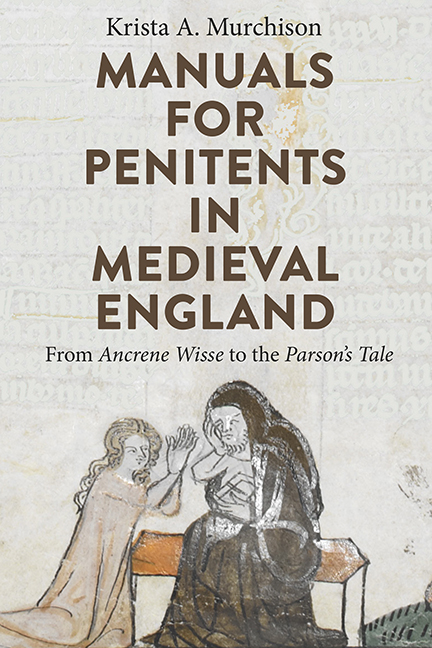Book contents
- Frontmatter
- Contents
- Acknowledgements
- Abbreviations
- Note on the Translation and Treatment of Texts
- A Chronological List of Key Manuals for Penitents and Associated Works
- Introduction: Teaching Sin
- Part I Self-Examination Writing before 1250
- Part II Manuals for Penitents, 1250–1300
- Part III Manuals for Penitents, 1300–1350
- ‘To enden in som vertuous sentence’: Concluding with Chaucer’s Parson
- Bibliography
- Index
2 - ‘A Woman in Whom Great Trust was Placed’: Differentiated Education and Ancrene Wisse
Published online by Cambridge University Press: 07 October 2022
- Frontmatter
- Contents
- Acknowledgements
- Abbreviations
- Note on the Translation and Treatment of Texts
- A Chronological List of Key Manuals for Penitents and Associated Works
- Introduction: Teaching Sin
- Part I Self-Examination Writing before 1250
- Part II Manuals for Penitents, 1250–1300
- Part III Manuals for Penitents, 1300–1350
- ‘To enden in som vertuous sentence’: Concluding with Chaucer’s Parson
- Bibliography
- Index
Summary
It is generally accepted as a truism that the introduction of Canon 21 at the Fourth Lateran Council of 1215 represents the most important moment for the development of medieval pastoral education. The Canon, known by its famous opening words, Omnis utriusque sexus, called for annual confession for anyone who had reached the age of majority. According to the traditional narrative, the Canon's requirement of annual confession was an innovation – one which, on one hand, extended the powers of the Church through an insidious form of mind control, while, on the other, promoted a sustained form of self-reflection. This striking confluence of social control and inward reflection has led many to take the Fourth Lateran Council as the starting point for a master narrative of modernity.
This master narrative has been challenged and shown to be progressivist in various domains, and the premise on which it is based – the apparently innovative nature of the injunction to confession of Lateran IV – has been questioned. Most now recognize that the requirement of annual confession established at the Fourth Lateran Council was not a complete innovation. It is also amply clear from the self-examination material that preceded the Council that sustained self-reflection was in no way a novelty in the thirteenth century. The idea that the Fourth Lateran Council was a kind of gateway to self-reflection – and, concomitantly, to modernity – must therefore be firmly rejected. Nevertheless, as with many master narratives, this one contains a seed of truth. Even those who question the innovative nature of Canon 21 recognize that confessional legislation of this scale was unprecedented at the time, and that it brought with it a greater focus on pastoral education and a new need for tools for promoting self-examination among the laity and clergy alike.
As the evidence here shows, the authors of self-examination material in this period, facing new pastoral needs, drew on cutting-edge educational strategies of the sort that were being described in contemporary sermon-writing guides. These include educating a diverse audience through material pitched at individual audience members – a strategy referred to here as ‘differentiated instruction’. The goal at hand is to explore how these educational techniques are used in self-examination works, and to highlight the creative ways in which differentiated instruction is deployed in one of the bestsellers of thirteenth-century pastoral writing, Ancrene Wisse.
- Type
- Chapter
- Information
- Manuals for Penitents in Medieval EnglandFrom <i>Ancrene Wisse</i> to the <i>Parson’s Tale</i>, pp. 42 - 64Publisher: Boydell & BrewerPrint publication year: 2021



